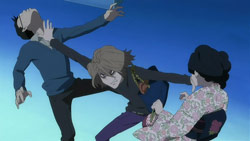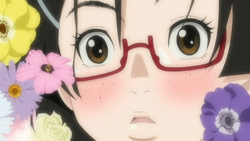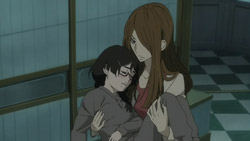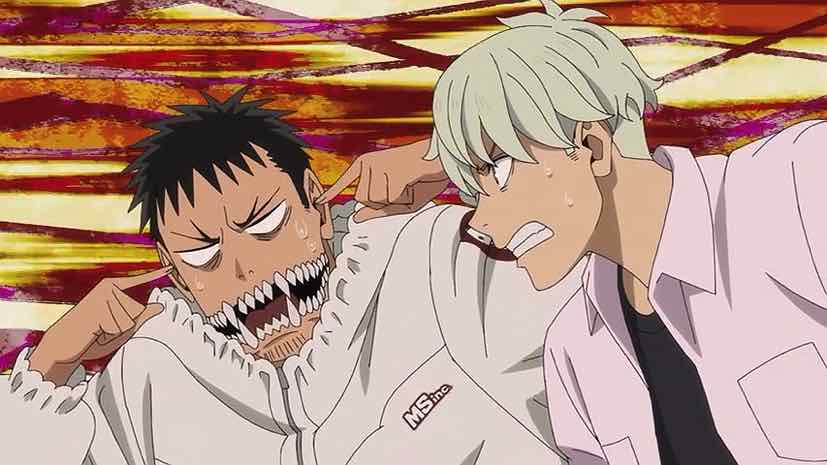Some series take a while to grow on you – like Soredemo and Shiki. You can’t fully appreciate their charms right away, or the creative mix isn’t quite there out of the gate. Some series grab you immediately and won’t let go, like Cross Game. You know from the first episode that the battle is over. Kuragehime definitely falls into the latter category. As I said in my review of the first episode, “You had me at hello.”
Indeed, from the moment the clever, cute and hilarious OP song/animation rolled, I had the feeling this show was something special. It’s not a conventional, plot-driven series – indeed, it came closest to ordinary when it tried to be one. Kuragehime is a feeling as much as a television show – a warmth that grows as you watch Tsukimi, Kuranosuke and Shu go through their paces. There were lots of excellent comedic supporting players – the Amars, the PM, Hanamori – but the show was really about those three people. While not a “romance” series per se, it was as romantic as any series this season.
I think of this as a very simple show about very complex people. The overlying plot is bare-bones – a bunch if quasi-cloistered single women living in an apartment complex that’s in danger of being torn down in a redevelopment project. But that exists mainly as a catalyst to bring the lead characters together, and they’re wonderful – despite all being broken in some way, they’re immensely lovable and charming. Though the two leads are technically teenagers, because they’re college-aged we’re treated to different character dynamics than we often see in anime. Kura and Tsukimi are polar opposites – a classic case of opposites attract. While he’s sexually experienced, cynical and rich, she’s chaste, innocent and dirt-poor.

In one important way, though, these two young people are very much alike. Both live in a fantasy world largely of their own construction, largely as a result of losing their mothers. For Tsukimi, losing her mother to illness is the consuming moment in her life – we never see or hear her father, and she escaped her boring, protected life among the Amars by slipping away to dreams of jellyfish – drawing them, painting them, dreaming of them. Kura lost his mother, too – but rather than to illness, to social niceties and political necessity. Because she was not an acceptable accessory in Kura’s politically connected father’s life, she was hidden away – even from her son. His response is to dress like a woman (and a beautiful one at that) – both to annoy his father and to feel connected to his mother.
The third wheel – and the other indispensable character here – is Kura’s older brother Shu. He’s naive, virginal, and proper – a “trophy son” for his father with an empty personal life. He falls for Tsukimi, but not the real one – the glamorous one Kura created. Later, his path crosses with the aptly named vixen Inari – a developer who sees Shu as a useful victim to get the redevelopment support her company needs from the government. She’s interesting, too – cold and cruel, but somehow with a core of self-doubt that pops up at inconvenient times. She exists in this story as a catalyst to roust Shu from his arrested emotional development, and she does it by staging a sex scene to blackmail him, not realizing he’s a virgin. Shu’s story is the saddest in the series, no question. He’s a thoroughly decent and trusting soul, hopelessly gullible. His story is full of pain, and the one element that the series leaves not just unresolved but totally uncertain.
Of the Amars I would say this – while they do remain somewhat one-dimensional apart from Chieko, they’re quite relateable. As Tsukimi and Kura do, they live in a fantasy world of their own creating – safe in their “No men allowed” sanctuary where they can pursue their individual obsessions undisturbed by any outside social contact. The anime is pretty unstinting in its treatment of the Amars – while sympathetic to them, it doesn’t gloss over the cold hard facts about their existence. They’ve chosen to live a life apart – allowed to do so by their parents’ financial support – and they’re fundamentally lonely and isolated. Tsukimi knows this – on some level, you can see her question whether this is a life she truly wants for herself. But it isn’t until Kuranosuke appears that she begins to see another alternative – at first simply through his fearless, glamorous approach to life – but later, as she starts to see him as someone beautiful inside and out.

This show, as much as any I can remember, suffers from having only one cour – and an 11-episode one at that. Noitamina shows typically don’t have huge DVD sales (that’s where the money is) and there’s nothing inherent in the material that would make me think Kuragehime would be popular. Director Takahiro Omori’s choice – and I think it’s a good one – is to keep the complexity and subtlety of the character development intact. The cost of this is that we’re allowed to barely scratch the surface of the potential in the three main characters, and that’s a high price to pay. But the alternative would have been to dumb the show down and “conventionalize” it – and that would have drained the very essence of what the series is away. Omori is a wonderful and versatile director, having helmed excellent series like Baccano!, Natsume Yuujinchou and Gakuen Alice. He made a silk purse of a sow’s ear by treating the material with respect and not even trying to give the show an ending, which would of necessity have felt false and rushed. Instead he let things naturally progress to a nexus point, and left the rest to our imaginations.
This was truly a wonderful series. It masters the rare ability to be both very funny and quite sad, often simultaneously. The affection of the writer for the characters is apparent, and infectious. They’re just a delight to spend time with every week, no matter what happens on screen. The moment when Kuranosuke carried Tsukimi to bed as she dreamed it was her mother doing so may just have been my favorite moment of the series – warm, romantic and totally true to the material and the characters. That’s a good snapshot of why I do love this show so much – it never annoyed or angered or bored me, just gently wrapped me up and pulled me along for eleven all too short weeks.





